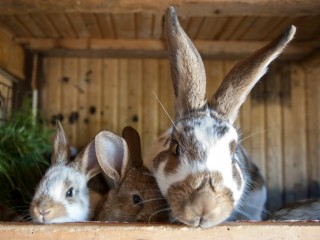

Rabbits breathe faster than humans. When a rabbit is lying down, its breathing is more noticable to you. Check its breathing rate. Normal respiratory rate is 30 to 60 breaths per minute. Some rabbit breath faster than this if stressed or overheated. If your rabbit is breathing faster than normal, give your rabbit a quick health evaluation to determine if you need to call the vet.
Here are some questions to ask yourself:
Is your rabbit:Acting normal, Eating, Drinking, Pooping and peeing normally, Relaxed most of the time, Affectionate or Moving around her cage or its cage?
If you can answer “yes” to these questions, then your rabbit is probably fine. Remove it to a quieter location where it’s cooler and give it water. The Rabbit should start to breathe normally again. If not, contact your vet.
If you answer “no” to any of the above questions or if your rabbit has any of these symptoms, call your vet:
Flinching as if in pain, Not eating, Not drinking, Staying crouched or hunched up all the time, Acting frightened, Not able to move, Grunting and labored breathing, Lips or tongue has a blue tint and Head tilted upward-clean sign your rabbit can’t breathe
If your rabbit is breathing fast, but looks healthy and is in a cool location, especially if it’s hot, but shows no symptoms of illness, it is fine. But the rabbit may breathe quickly because she’s scared or in shock. In the wild, rabbits steer clear of their predators, you rabbit has the same prey animal instincts. Rabbits frighten easily. If your pet rabbit is afraid you’ll notice she hides, acts restless like she wants to run away, grunts and breathes heavily. Your rabbit might thump the ground which is an instinct domestic rabbits get from their wild rabbit cousins to warn of danger. Loud noises such as a barking dog near a rabbit’s cage, loud music or screaming can give a rabbit a heart attack or put her into shock. A cat sneaking around your rabbit’s cage can also scare a rabbit into shock. Shock can cause the rabbit to die suddenly. It doesn’t happen a lot, but it’s possible. Socializing your young rabbit is important. They learn that their owners house or backyard is a safe place for them.
 Contact Jaguza Support
Contact Jaguza Support